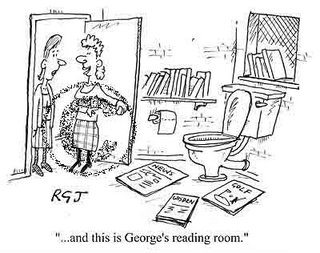
Many (and I mean many) years ago I was given a superbly interesting Christmas present by one of my uncles: a tiny radio. It was blue and could only be listened to by use of an earphone. The reception was (how shall I phrase it?) erratic. The only time that you could possibly hope to listen to any recognisable sounds was when the moon was high, the pressure was low and you were turned reverently towards some mythical station whose name only appeared on the illuminated dials of ancient radios. If you deviated from strict alignment by the thousandth part of a degree then you were left with instant white noise, and, let me add, that degree of variation was produced by your beating heart, so constant listening pleasure was not really feasible. But, but, but, it was a wonderful present. Just because it didn’t work did not detract from its wonder.
There is a whole series of possessions that all normal people (I thought that I would use that little rhetorical device to protect the guilty) have which cannot be justified in terms of their utility or, indeed, in terms of anything at all.
The can openers that do not work well, or at all, but they have been in the family for over twenty years and so it is unthinkable that they be thrown away; the weighing scales which have to be scaled themselves to get anything like an approximation of correct weight; fountain pens that have not seen ink for three generations; towels (and this is one that I do not comprehend) that do not soak up water efficiently, but which are still kept and laundered and put back in cupboards to be used and scorned time and time again. How expensive is a bloody towel for god’s sake?
Cutlery that doesn’t work: knives, after all, are supposed to cut. So get rid of them all. Buy new. Create a new tradition. Pencil sharpeners that break the lead in the pencil and do not, and have never, sharpened a pencil in their miserable lives: but thrown away, no! Sellotape dispensers which do not allow the tape to be cut; the only thing that they dispense is angst and tape which folds back on itself. Mobile phones! Mobile phones which are the size of small flats; have batteries which stay charged for seconds and have all the sex appeal of a leprous yak. Are they thrown out or recycled? No, they are kept together in the darkness of an obscure drawer, presumably so that at the end of times they can rise up and take their place on the right hand of Marconi. And don’t you feel superior reading this, you think about your own home and the ostentatious detritus resting like terminal moraine in secret places in your domicile; stuff that never is used, never will be used and never will be thrown out!
When you start to pack up your home you find many things like that. I am loath to put a figure on the items that you find because it is too shaming. I would estimate that in any home which has been lived in for more than ten years, more than 40% (by weight) of the home is stuff which can be thrown away without any noticeable effect on the running of the house and the universe.
The point that I almost made a number of paragraphs ago was that the spectacular and innovative and exciting from years ago is now the quotidian and boring. My exciting mini radio: a present of awe and wonder is now to be found in a Christmas cracker. I know - I look at the backs of boxes of the things. I am fascinated by them. How ordinary that extraordinary gift in my childhood has become. I felt the same way about digital watches. I can remember watching ‘Tomorrow’s World’ with Raymond Baxter when he demonstrated one of the first digital watches. It was a thing of science fiction, amazing and in a true sense fabulous. It still had a little of that mystique when, wearing my own digital watch I went to see the first part (not the first part, the first film made, you know what I mean) of ‘Star Wars.’ As the glittering, futuristic epic began its filmic journey, I looked from the film to my wrist and back to the film and I felt that part of that amazing life presented on the screen was ticking (well, a crystal oscillating silently) on my wrist. The final disillusionment was when I noticed that a container of car oil had a free digital watch stuck to it!
I felt the same way about digital watches. I can remember watching ‘Tomorrow’s World’ with Raymond Baxter when he demonstrated one of the first digital watches. It was a thing of science fiction, amazing and in a true sense fabulous. It still had a little of that mystique when, wearing my own digital watch I went to see the first part (not the first part, the first film made, you know what I mean) of ‘Star Wars.’ As the glittering, futuristic epic began its filmic journey, I looked from the film to my wrist and back to the film and I felt that part of that amazing life presented on the screen was ticking (well, a crystal oscillating silently) on my wrist. The final disillusionment was when I noticed that a container of car oil had a free digital watch stuck to it!
But we keep around us all the superseded historical mementos from our lives. To throw them away is to throw away a part of ourselves. Each useless item is a tiny but essential anecdote in our autobiography. It is one of those charged artefacts that, like Proust's Madeleine, can cause memories to spring forth; something which has a worth which far outweighs its intrinsic value.
So I’m not throwing anything away. So there!
There is a whole series of possessions that all normal people (I thought that I would use that little rhetorical device to protect the guilty) have which cannot be justified in terms of their utility or, indeed, in terms of anything at all.
The can openers that do not work well, or at all, but they have been in the family for over twenty years and so it is unthinkable that they be thrown away; the weighing scales which have to be scaled themselves to get anything like an approximation of correct weight; fountain pens that have not seen ink for three generations; towels (and this is one that I do not comprehend) that do not soak up water efficiently, but which are still kept and laundered and put back in cupboards to be used and scorned time and time again. How expensive is a bloody towel for god’s sake?
Cutlery that doesn’t work: knives, after all, are supposed to cut. So get rid of them all. Buy new. Create a new tradition. Pencil sharpeners that break the lead in the pencil and do not, and have never, sharpened a pencil in their miserable lives: but thrown away, no! Sellotape dispensers which do not allow the tape to be cut; the only thing that they dispense is angst and tape which folds back on itself. Mobile phones! Mobile phones which are the size of small flats; have batteries which stay charged for seconds and have all the sex appeal of a leprous yak. Are they thrown out or recycled? No, they are kept together in the darkness of an obscure drawer, presumably so that at the end of times they can rise up and take their place on the right hand of Marconi. And don’t you feel superior reading this, you think about your own home and the ostentatious detritus resting like terminal moraine in secret places in your domicile; stuff that never is used, never will be used and never will be thrown out!
When you start to pack up your home you find many things like that. I am loath to put a figure on the items that you find because it is too shaming. I would estimate that in any home which has been lived in for more than ten years, more than 40% (by weight) of the home is stuff which can be thrown away without any noticeable effect on the running of the house and the universe.
The point that I almost made a number of paragraphs ago was that the spectacular and innovative and exciting from years ago is now the quotidian and boring. My exciting mini radio: a present of awe and wonder is now to be found in a Christmas cracker. I know - I look at the backs of boxes of the things. I am fascinated by them. How ordinary that extraordinary gift in my childhood has become.
 I felt the same way about digital watches. I can remember watching ‘Tomorrow’s World’ with Raymond Baxter when he demonstrated one of the first digital watches. It was a thing of science fiction, amazing and in a true sense fabulous. It still had a little of that mystique when, wearing my own digital watch I went to see the first part (not the first part, the first film made, you know what I mean) of ‘Star Wars.’ As the glittering, futuristic epic began its filmic journey, I looked from the film to my wrist and back to the film and I felt that part of that amazing life presented on the screen was ticking (well, a crystal oscillating silently) on my wrist. The final disillusionment was when I noticed that a container of car oil had a free digital watch stuck to it!
I felt the same way about digital watches. I can remember watching ‘Tomorrow’s World’ with Raymond Baxter when he demonstrated one of the first digital watches. It was a thing of science fiction, amazing and in a true sense fabulous. It still had a little of that mystique when, wearing my own digital watch I went to see the first part (not the first part, the first film made, you know what I mean) of ‘Star Wars.’ As the glittering, futuristic epic began its filmic journey, I looked from the film to my wrist and back to the film and I felt that part of that amazing life presented on the screen was ticking (well, a crystal oscillating silently) on my wrist. The final disillusionment was when I noticed that a container of car oil had a free digital watch stuck to it!But we keep around us all the superseded historical mementos from our lives. To throw them away is to throw away a part of ourselves. Each useless item is a tiny but essential anecdote in our autobiography. It is one of those charged artefacts that, like Proust's Madeleine, can cause memories to spring forth; something which has a worth which far outweighs its intrinsic value.
So I’m not throwing anything away. So there!













































